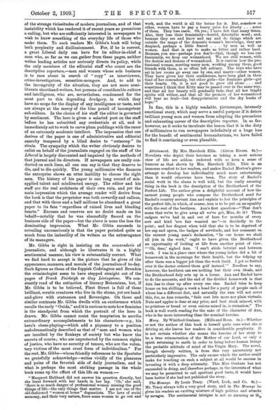Attainment. By Mrs. Havelock Ellis. (Alston Rivers. 8s.)— Novelists who
depict their heroines as Wring a most serious view of life are seldom endowed with so keen a sense of humour as that shown by Mrs. Havelock Ellis. This is an immense comfort to her readers, and makes Rachel Merton's grave attempt to develop her individuality much more entertaining than it would otherwise have been. The story of Rachel's social work in the slums is well told, but the really amusing thing in the book is the description of the Brotherhood of the Perfect Life. The author gives a delightful account of how the earnest young people who compose the Brotherhood send for Rachel's country servant Ann and explain to her the principles of the perfect life, in which, of course, Ann is to be put on an equality with the rest of the brethren. Ann's first question—" That don't mean that we're to give away all we've got, Miss, do it P Thera cadgers we've had in and out of here for months of every sort and kind 'ave fair wearied me "—is decidedly to the point; and her disgust when told that she is to be deprived of her cap and apron, the badges of servitude, and her comment on the earnest young man's declaration, "In our house we shall all join in the work," ought to have given the Brotherhood an opportunity of looking at life from another point of view.
" Oh, dear,' sighed Ann. can't abide betwixt and between work. I was in a place once where the young ladies did a bit of housework in the mornings for their health, but the tidying up after them was a bigger job than the work itself. I got so fretted over it the doctor ordered them golf instead." Needless to say, however, the brethren can see nothing but their own ideals, and the Brotherhood duly seta up in a house. Ann and Rachel have to do the accounts, and the end of the divided housework is that Ann has to clear up after every one else. Rachel tries to keep house on ten shillings a week a head for a party of people each of whoni has a different diet, and naturally the sum will not cover this, for, as Ann remarks, "fads cost lots more nor plain victuals. Nuts and apples is dear at any price, and best steak minced, with no potatoes or bread or even onions mixed in, is ruination." The book is well worth reading for the sake of the character of Ann, who is far more interesting than the nominal heroine.


























































 Previous page
Previous page